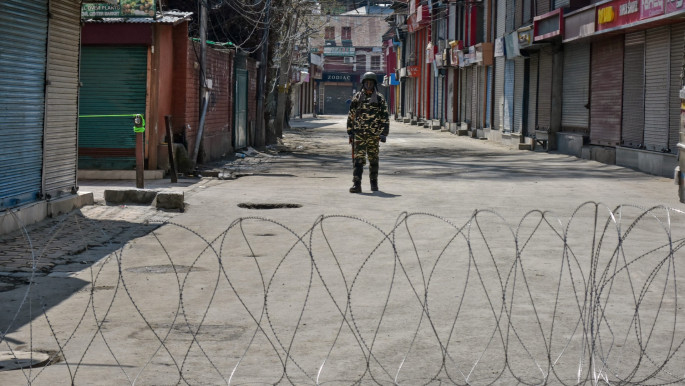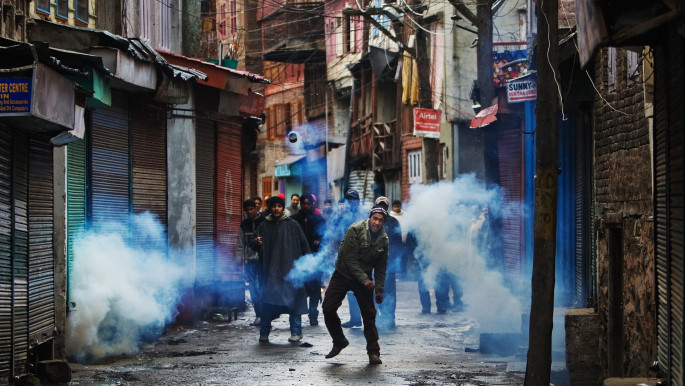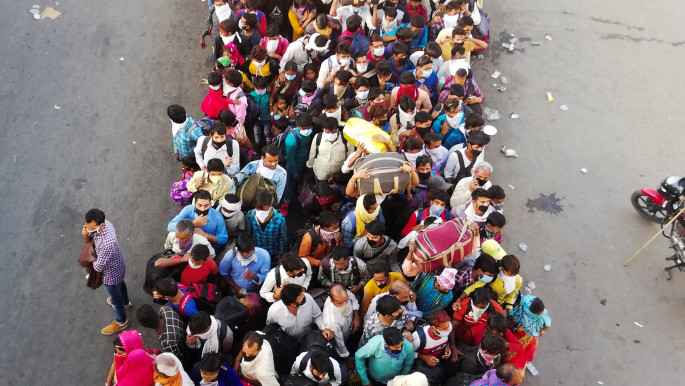India's draconian internet shutdown hinders Kashmir's battle against Covid-19
Indian-administered Kashmir suffered a seven-month internet ban after New Delhi stripped the Muslim-majority region of its statehood and semi-autonomy in August last year, thought to be the longest communications blackout of its kind in the world.
After thousands took to the streets to protest the measures, and amid growing international pressure, the Indian government eventually restored broadband internet services and limited mobile connectivity last month, although high-speed mobile access remains suspended.
But the ban has caused immeasurable damage to society and the economy. The blackout hit businesses hard, leading to a spike in unemployment, while students faced immense difficulties in continuing their studies.
The media too, of course, was hit badly. While the Indian government provided makeshift facilities for established mainstream media organisations to access the internet, the communications ban had a detrimental impact on independent outlets, marking the end of a decade which had seen the rise of alternative media in Kashmir.
The death of alternative media
 |
|
| Read more: Emerging from brutal Indian clampdown, Kashmir braces for coronavirus |
Fahad Shah, Editor-in-Chief of The Kashmir Walla, one of the first online news outlets started during the 2010 uprising, told The New Arab that their focus was on issues that the daily papers did not cover or spend their resources on.
"Online media is very important today, especially in Kashmir, where news is so diluted. It is important to have independent media houses which function as media watchdogs and provide a real picture to those who don't live here," he told TNA. "It is easy to function and reaches millions of readers with just one click."
Shah said the "brutal" internet ban particularly damaged online and independent reporting.
"Online media was dead during the lockdown. There is no way to run alternative voices either. Snatching the internet from journalism today is like asking a newspaper to print without paper but only ink. Smaller media houses like ours have faced a massive loss. Staying alive has become a daily battle," he said.
Another lockdown
At a time when Kashmir was limping back towards normalcy - markets had reopened, traffic was on the roads again and schools, colleges and universities had reopened too - the restoration of high-speed broadband internet filled the population with hope.
It was assumed that high-speed mobile internet would be restored as well, but such hopes were dashed as the Indian government kept extending the restrictions.
 |
Indian-administered Kashmir had suffered a seven-month internet ban after New Delhi stripped the Muslim-majority region of its statehood and semi-autonomy last year |  |
Kashmir had yet to come to terms with the impact of the months-long Indian shutdown when the world was engulfed with a new problem: the coronavirus.
The question of Kashmir, which had managed to garner little international attention since the communications blackout, found itself side-lined once again.
Read more: India's coronavirus outbreak unmasks the ugly face of Islamophobia
As Covid-19 finally arrived in India the government announced yet another lockdown, but this time, unlike the rest of the world, Kashmiris, and especially journalists, had to grapple with a lack of high-speed mobile internet connection.
Online media without the internet
As Covid-19 restrictions spread, independent media was once again struck by reporting difficulties.
Established media houses resumed services after the restoration of broadband internet, but working from anywhere apart from an office meant a devastatingly slow connection.
Small independent media houses and freelancers who are working from home since the outbreak have no access to broadband or lease-line internet facilities in their homes. They are operating wholly from mobile phones with a speed of just 20-80kbps. From researching and writing, to editing and publishing, everything is done by phone.
 |
|
| Read more: 'Palestine in the making': India's new Kashmir domicile law mirrors Israel's settler-colonial blueprint |
Mansoor Peer, a health correspondent in one of the leading newspapers of the valley, said that working from home in Kashmir is an altogether different experience from rest of the world during the Covid-19 lockdown.
"Our internet connection is so slow that I as a heath correspondent am not able to put every single detail in my story. It takes hours to load a page full of information available on Covid-19," he told The New Arab.
Read more: Muslims in Asia brace for Ramadan in the shadow of coronavirus
"I recently missed the opportunity of being a part of webinar on Covid-19. I then got an audio track of the event to keep myself updated about the interaction between medical professionals and media professionals," Peer, who works with Rising Kashmir newspaper, said.
Impact on healthcare
People working on the frontlines to stop the spread of Covid-19 and treat the infected are being called superheroes around the world. But for the same heroes in Kashmir, it takes hours just to download World Health Organization (WHO) guidelines.
The Doctors Association of Kashmir, in a heart-warming gesture, made sure all specialists in Kashmir were available by phone for minor consultations to avoid a rush in hospitals. But it was not as easy as it seemed.
 |
Kashmir had yet to come to terms with the impact of the months-long Indian shutdown when the world was engulfed with a new problem: the coronavirus |  |
A doctor working in one healthcare facility in Kashmir said that a mobile phone conversation with a patient is not enough.
"I get so many calls from patients who tell me that they have a stomach pain and when I ask them where exactly they just say 'stomach'. Had video conferencing been possible, then the patient-doctor conversation would have been much better," he said.
"I would say, instead of staying at home, the lack of high-speed internet is forcing people to come out of their houses," he lamented.
Education hit hard
 |
|
| Read more: The long walk home: Modi's coronavirus lockdown triggers mass exodus of India's desperate migrant workers |
With Kashmir being a politically sensitive region marred with conflict for decades, people are used to lockdowns and internet blackouts.
Schools in the region had only just reopened a week before Covid-19 restrictions were imposed, nearly seven months after India stripped Kashmir of its partial autonomy.
While schools across the world have started online classes in the event of the lockdown, Kashmiri students are not so privileged.
Yusra Hamid, who teaches at Luminous Public School in the capital of the valley, said that internet speed is the main hurdle in providing educational resources online.
"Online classes cannot replace a classroom as there is lack of rapport between the teacher and the student. The internet speed is the thing which concerns me most. The video quality is poor and blurred because of the 2G speed internet," said Yusra.
While online classes have tried to ensure Kashmiri students can compensate for their months of lost education, the communications ban has taken its toll.
"While the world is facing the terrible Covid-19 crisis, we, as teachers, are trying our level best to save the careers of students. But that would be only possible with high-speed internet for all".
Follow him on Twitter: @bhatMuheet
Sheikh Uzair is a freelance journalist. He has a master's in mass communication from the University of Kashmir. A former staffer at Kashmir Reader newspaper, his work has appeared in international publications





 Follow the Middle East's top stories in English at The New Arab on Google News
Follow the Middle East's top stories in English at The New Arab on Google News


